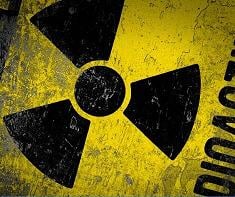Forest Fires in Ukraine: Chernobyl All Over Again

Forest fires rage in Ukraine dangerously close to Chernobyl. Ukrainian interior minister Arsen Avakov said conditions “worsened.”
“The forest fire is heading in the direction of Chernobyl’s installations,” he said. Treetop flames and strong gusts of wind have created a real danger of the fire spreading to an area within 20 kilometers of the power plant.”
“There are about (1,000 acres) of forests in the endangered area,” he claimed. “National Guard and interior ministry forces have been put on combat alert.”
The April 26, 1986 Chernobyl incident was the worst nuclear power plant disaster up to that time – exceeded only by Japan’s Fukushima (March 11, 2011).
Nuclear expert Helen Caldicott called it “by orders of magnitude many times worse than Chernobyl.”
The effects of both catastrophes are still being felt. A 2009 New York Academy of Sciences (NYAS) study said Chernobyl killed around one million people and counting. The official IAEA figure claiming around 4,000 was fabricated to downplay the disaster.
NYAS said:
“This is a collection of papers translated from the Russian with some revised and updated contributions.”
“Written by leading authorities from Eastern Europe, the volume outlines the history of the health and environmental consequences of the Chernobyl disaster.”
“According to the authors, official discussions from the (IAEA) and associated (UN) agencies (e.g. the Chernobyl reports) have largely downplayed or ignored many of the findings reported in the Eastern European scientific literature and consequently have erred by not including these assessments.”
According to Greenpeace Russia, “(a) very large, catastrophic forest fire is taking place in a 30-km zone around the Chernobyl power plant.”
“We estimate the real area of the fire to be (25,000 acres). This is based on satellite images. This hasn’t been officially acknowledged yet.”
Eminent British nuclear expert Chris Busby explains the grave danger fires pose comes from spreading radioactive contaminants over a vast area, saying:
“Some of the materials that were contaminating that area would have been incorporated into the woods.”
“In other words, they landed on the ground in 1986 and they got absorbed into the trees and all the biosphere.”
“And when it burns, they just become re-suspended. It’s like Chernobyl all over again.”
“All of that material that fell on the ground will now be burned up into the air and will become available for people to breathe.”
In 1953, future physiology and medicine Nobel laureate George Wald said “there’s no such thing as safe nuclear power.” He called its danger “intolerable, altogether unacceptable.”
He called for “closing down all nuclear power plants tomorrow.” Doing it now is more urgent than ever given their inherent hazards.
Helen Caldicott stresses it, saying:
“As a physician, I contend that nuclear technology threatens life on our planet with extinction.”
“If present trends continue, the air we breathe, the food we eat, and the water we drink will soon be contaminated with enough radioactive pollutants to pose a potential health hazard far greater than any plague humanity has ever experienced.”
Fukushima’s ongoing disaster explains it. So does Chernobyl’s nightmare – resurfacing what never went away.
Einstein once said “splitting of the atom changed everything but (humanity’s) mode of thinking.”
He called nuclear power “a hell of a way to boil water.” It creates radioactive steam.
Disasters are unavoidable. Ingested radioactive particles like what are spreading from ongoing fires near Chernobyl guarantee a greater European cancer epidemic than already.
The late molecular and cell biology Professor John Goffman once said “(t)he nuclear industry is waging war against humanity.”
“Licensing a nuclear power plant is in my view, licensing random premeditated murder.”
Radiation produces cancer, he stressed – even minuscule amounts too tiny for the human eye to see. Planet earth is being systematically irradiated. Wakeup calls like forest fires raging near Chernobyl spreading radiation go unheeded.
Stephen Lendman lives in Chicago. He can be reached at [email protected]. His new book as editor and contributor is titled “Flashpoint in Ukraine: US Drive for Hegemony Risks WW III.” http://www.claritypress.com/LendmanIII.html Visit his blog site at sjlendman.blogspot.com. Listen to cutting-edge discussions with distinguished guests on the Progressive Radio News Hour on the Progressive Radio Network. It airs three times weekly: live on Sundays at 1PM Central time plus two prerecorded archived programs.

